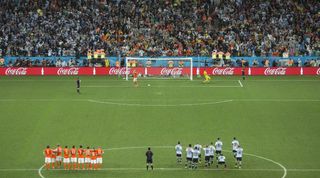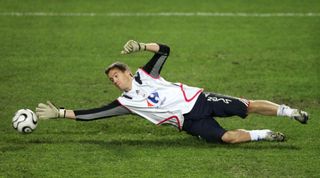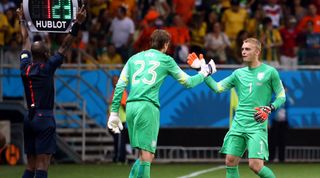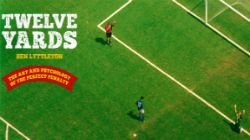Penalties, legends and the self-fulfilling destiny
Players and managers can win and lose shootouts, says Ben Lyttleton - and legends quickly arise...

The similarities between the penalty shootout and the shootouts of Spaghetti western films are obvious. Two hours of back-and-forth tension is ended. It’s the battle between good (your team) and evil (the opponents). Death or glory. No middle ground. The drama even has the same name. The shootout. You don't nearly survive a shoot-out, just as you can’t narrowly lose at penalties.
Jun 26: BRA 3-2 CHI
Jun 29: CRC 5-3 GRE
Jul 5: NED 4-3 CRC
Jul 9: ARG 4-2 NED
As I was watching Holland beat Costa Rica on penalties last week, I was reminded of a line from The Man Who Shot Liberty Valance. As newspaper reporter Maxwell Scott tells US Senator Ransom Stoddard, after learning that Stoddard had not shot the eponymous outlaw: “This is the West, sir. When the legend becomes fact, print the legend.”
The legend, in the case of the World Cup quarter-final, was that Tim Krul was a penalty specialist – in Holland they call them ‘penalty killers’, to further the link with the movies. The truth was that Krul, who came on as a last-minute substitute goalkeeper specifically for the shootout, had saved two of his last 20 penalties (a 90% rate of conversion) and in fact Michel Vorm, Holland’s third-choice goalkeeper, has a better penalty record, with three saves from 11 penalties faced (72% conversion). As Krul saved two of the five Costa Rica penalties he faced – diving the right way for all of them – the legend became fact.
The self-perpetuating penalty legend
When it comes to penalties and goalkeepers, reputation matters. While researching my book Twelve Yards: The Art and Psychology of the Perfect Penalty, I found goalkeepers whose journey to ‘penalty killer’ status was almost self-fulfilling.
There was Mickael Landreau, the former France goalkeeper who saved a penalty on his Nantes debut when he was just 16 years old. From that point on, any opponent confronted with Landreau from the spot was convinced he was an expert, and would aim closer to the corner, therefore decreasing his own margin for error. As more players missed, so the reputation grew. Landreau was on the bench for France at the 2006 World Cup Final, and could have replaced Fabien Barthez for the penalty shoot-out, which ultimately France lost.
Get FourFourTwo Newsletter
The best features, fun and footballing quizzes, straight to your inbox every week.
“It crossed my mind for a moment,” said coach Raymond Domenech on whether he had considered the switch. “But it’s a heavy decision, it’s tough for the one who goes off. If it was an average goalkeeper, that question comes up – but Fabien had stopped penalties before, and so we did not do it.” Landreau even saved a penalty from Ronaldinho, when he was at PSG, by standing right next to one goalpost: the Brazilian rolled the ball straight at him.

Something similar happened to Marcos. The Brazilian goalkeeper also saved a penalty on his first start for Palmeiras in 1996, but only sealed his ‘legend’ three years later by saving Corinthians midfielder Vampeta’s penalty in the 1999 Copa Libertadores quarter-final. The next season, this time in the semi-final of the same competition, Marcos was again the shootout hero against Corinthians. His reputation as a penalty killer was secure. In later seasons, Palmeiras went on to beat São Caetano, Cruzeiro, and Sport Recife on penalties; Marcos even saved three against Atletico Goianense, but his team still lost.
“It’s good to know that I have respect from penalty-takers,” Marcos wrote in his autobiography São Marcos de Palestra Itália. “My reputation as a penalty saver helps. But I want to stop this reference to me being a saint, a hero, that kind of stuff, because it obliges me to make Palmeiras win all our penalty shootouts, and that’s not possible.” Marcos had never claimed to be a penalty expert, but the myth surrounding his heroics against Corinthians grew and forced takers to adjust their tactics against him.
In words that might come back to haunt Krul, Marcos went on to write: “I am tired of this penalty save. It seems that’s all I did in my career, but a whole career is much more than a lucky stop or a mistake. I don’t want my football life to be reduced to one penalty against Corinthians.” (Though it wasn’t: Marcos won two Brazilian leagues, a Copa Libertadores and was Brazil’s goalkeeper for their victorious 2002 World Cup campaign.)
Krul twist
Van Gaal's decision to bring on Krul for the quarter-final was vindicated but had after-effects in the semi-final. When the manager had to replace the tiring Robin van Persie in extra-time, his third substitution had been made: Krul stayed on the bench for the shootout, which must have given Argentina confidence. Jasper Cillessen tried to copy Krul’s penalty tactics, walking around the area and talking to the kickers, but it looked unconvincing. Why was he not being himself?

Ahead of Sunday’s World Cup final between Germany and Argentina there are a few other things we have learned about penalties at this World Cup. The main one, as Van Gaal proved, is that coaches can affect the outcome – for better or worse. The former head of British cycling, Sir Dave Brailsford, even suggested that coaches tell non-regular penalty-takers where to aim their penalties: “In times of stress, the first thing that goes are your decision-making faculties and this would give players one less thing to worry about,” he said.

A coach who allows his players to self-select the kickers and the order, as David Moyes did before Manchester United’s League Cup shootout defeat to Sunderland, is not fulfilling his job remit. That’s why Van Gaal’s second shootout covers him in less glory – he suggested after the game that two players refused to take penalties. Again, it’s his role to tell certain players that if Van Persie was not available, they might be taking on the job.
The pressure on the players is considerable. Note that Chile's Gonzalo Jara and Costa Rica's Michael Umana both missed when kicking to avoid defeat in the shoot-out; a few days earlier, Umana had scored the winning penalty against Greece.
This confirms a pattern: the conversion rate to win shoot-outs is 92% but this drops to 62% when kicking to avoid defeat; in World Cups, where the pressure is greater, that crucial conversion rate is as low as 44%. Umana, like Holland, has tasted both the glory and the pain of the penalty shootout.

Thank you for reading 5 articles this month* Join now for unlimited access
Enjoy your first month for just £1 / $1 / €1
*Read 5 free articles per month without a subscription

Join now for unlimited access
Try first month for just £1 / $1 / €1
